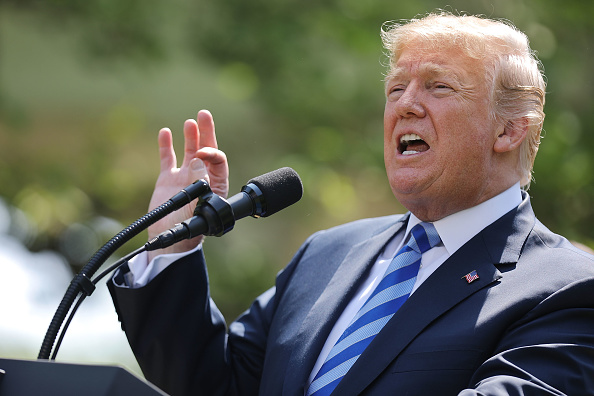
A newly published study adds to the increasing evidence suggesting that two malaria drugs pushed by President Donald Trump as treatments for Covid-19 don’t work in the disease, and may be doing more harm than good. The study closely follows comments that Trump made last Wednesday at a press conference that he had been using hydroxychloroquine for “a couple of weeks” to prevent Covid-19 – comments that a prescription drug savings program provider said appeared to drive a renewed surge in interest in the drug.
The study, published Friday in The Lancet by researchers in the U.S. and Switzerland, was an analysis of data on 15,000 Covid-19 patients receiving hydroxychloroquine or chloroquine, with or without the antibodies azithromycin or clarithromycin, as well as 81,000 controls. The data came from patients hospitalized between Dec. 20, 2019 and April 14, at 671 hospitals across six continents. In sum, the analysis found that the two malaria drugs, alone or in combination with the antibiotics, offered no benefit for patients with Covid-19 and were associated with an increased risk of serious heart rhythm complications.
Among patients in the control group, 9.3% died of Covid-19 in the hospital, compared with 16.4-22.2% of those receiving chloroquine alone or with an antibiotic and 18-23.8% of those receiving hydroxychloroquine alone or with an antibiotic. In addition, the incidence of heart arrhythmias was 14-27 times higher among those who received one of the malaria drugs with or without an antibiotic than among those who did not receive them.
The authors noted that the study had limitations and warned that the decreased survival associated with the drugs should be interpreted cautiously. The observational study design, they wrote, meant that they could not exclude the possibility of unmeasured confounding factors, and a cause-and-effect relationship between drug therapy and survival should not be inferred.
“These findings suggest that these drug regimens should not be used outside of clinical trials and urgent confirmation from randomised clinical trials is needed,” the researchers wrote.
Arrhythmia data also came with several limitations, such as lack of Qt intervals or stratified arrhythmia pattern. So too did the mortality data, as they didn’t establish whether the association of the drugs with deaths was linked to their cardiovascular risk, and there was no drug dose-response analysis of the observed risks. But they reiterated the finding that the drugs did not appear to provide any benefit.

A Deep-dive Into Specialty Pharma
A specialty drug is a class of prescription medications used to treat complex, chronic or rare medical conditions. Although this classification was originally intended to define the treatment of rare, also termed “orphan” diseases, affecting fewer than 200,000 people in the US, more recently, specialty drugs have emerged as the cornerstone of treatment for chronic and complex diseases such as cancer, autoimmune conditions, diabetes, hepatitis C, and HIV/AIDS.
“Even if these limitations suggest a conservative interpretation of the findings, we believe that the absence of any observed benefit could still represent a reasonable explanation,” they wrote.
The publication of the study came days after Trump raised eyebrows at a press conference by saying that he had been taking hydroxychloroquine to prevent Covid-19, despite warnings by the Food and Drug Administration and other bodies that the malaria drugs should not be used outside of hospitals or clinical trials. Other recent studies, published in The New England Journal of Medicine and the Journal of the American Medical Association, have also found that the drug does not appear to benefit patients with Covid-19.
Hydroxychloroquine also played a central role in the removal of Rick Bright from his position as director of the Biomedical Advanced Research and Development Authority. Bright stated in his whistleblower complaint that his removal stemmed from his objections to the promotion of the drug’s use. The FDA has given a narrow emergency use authorization for the drug in Covid-19, but it is not approved for the disease.
Meanwhile, although interest in hydroxychloroquine had died down since Trump initially began promoting it based on small and inconclusive studies, his recent statement about preventive use of the drug has reportedly driven increased interest in it.
SingleCare, a company that provides prescription drug savings programs, found a 700% increase in traffic to its web page for hydroxychloroquine on May 18, compared with the day before, while traffic increased by 17 times in the five hours after his remarks compared with the five-hour period before them.
Moreover, according to data provided by the company via email, based on the number of patients who use its prescription-discount cards, there was a 56% increase week-over-week in hydroxychloroquine prescriptions being filled on May 19, the day after Trump’s remarks, compared with the previous Tuesday. As of Friday afternoon, SingleCare had seen more than 200 scripts filled for hydroxychloroquine among its members, and the total number was on track to exceed the prior week’s by 22%. The 56% increase included both refills and new scripts, but mostly comprised new prescriptions.
“My best guess is that it’s due to Covid-19,” SingleCare chief pharmacy officer Ramzi Yacoub said in a phone interview, noting that the company’s data do not include indications for which drugs are prescribed. “What we saw before March was all the patients taking for lupus, rheumatoid arthritis and malaria, and utilization was pretty low. And then we’ve seen spikes ever since March.”
Photo: Chip Somodevilla, Getty Images
UPDATE: A previous version of this story stated that there had been a 15% week-over-week increase in the number of hydroxychloroquine scripts filled as of May 19. Subsequent to publication, the company stated that the number, which it had provided, was incorrect, and that the correct figure was 56%. The story has been updated.













